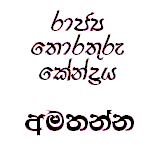One of the key objectives of ICT Human Resource Capacity Building Program under the e-Sri Lanka Project of ICTA is to develop an e-leadership capability in government by conducting awareness-raising and training for Chief Innovation Officers (CIOs), which is critical to implement reform and drive the process of re-engineering government and introducing e-government systems.
Under this initiative ICTA will develop e-leadership within government by conducting awareness-raising and training for Chief Innovation Officers (CIOs) appointed across all government ministries, departments, statutory bodies, district secretariats, divisional secretariats and provincial councils. The CIOs play a key role within the government working as a “Change Agent” and driving the e-transformation process. They will be equipped with specialist skills to ensure they are ready to champion change within their respective line ministries and departments. The role of the CIO in government could be described in more detail as follows:
- Lead and direct organizational strategic planning, creating and maintaining an ICT strategy to guide research, development and maintenance.
- Ensure organizational alignment with government ICT policy, as directed by the National Administrative Reforms Committee (NARC) and ICTA.
- Lead the establishment of world class systems and apply them to internal systems and processes to provide for continuous improvement of performance.
- Lead organization-wide efforts on information systems security, ensuring and maintaining standards.
- Maintain ICT utilization and sharing of information systems, applications, etc, and oversee ICT investments to ensure optimization and full range of cost trade-offs.
- Ensure inter-ministry (or inter-department) coordination on ICT and serve as the organizational spokesperson on ICT issues.
- Manage outsourced contracts and services.
CIOs will participate in, and contribute to, the development of overall e-government strategies, prioritization of projects and activities, project conceptualisation, planning and implementation, working in coordination with ICTA and its appointed project management and implementation teams. ICTA expects trained CIOs actively engaged in re-engineering government, driving change management and process re-engineering within their respective ministries and departments.
ICTA together with key international and local institutions has designed and delivered several training programmes to develop government human resources at multiple levels to support the public sector and deliver citizen services through e-government. Some of the key programmes delivered to CIOs are as follows;
- “e-Champions” an innovative programme created to equip a core group of 30 active CIOs, with the knowledge and skills to drive implementation of e-government. This key initiative was undertaken by ICTA in a strategic partnership with the World Bank Institute (WBI), Global Development Learning Network (GDLN), and the Distance Learning Centre (DLC) in Sri Lanka. The “e-Champions” Programme consisted of three components: a) Knowledge Sharing Sessions with renowned international experts via video conferences b) Face-to-Face Workshops to give participants the practical knowledge to e-government projects, which are currently not available in standard training courses and c) Study tours
- Study Tour on ‘Estonian e-Governance and ICT policy’ organized together with the e-Governance Academy of Estonia. This programme was organized to show the importance of having in place the right national policies and strategies in the field of information society in order to achieve meaningful impacts in real life and to fully realize a leapfrogging potential of ICTs in the country’s overall development and competitiveness.
- “e-Government Training programme for Chief Innovation Officers (CIOs)” is a specially designed programme for CIOs and delivered by the National Institute for Smart Government in India, to equip a group of 25 Sri Lankan CIOs, with the knowledge and skills to drive implementation of e-government. The training Programme consisted of classroom learning sessions with renowned e-Government personalities and study visits to e-Government sites in India.
- e-Governance MBA – Scholarships for a part time two year MBA at the University of Moratuwa









 Human Resources Capacity Building
Human Resources Capacity Building





















